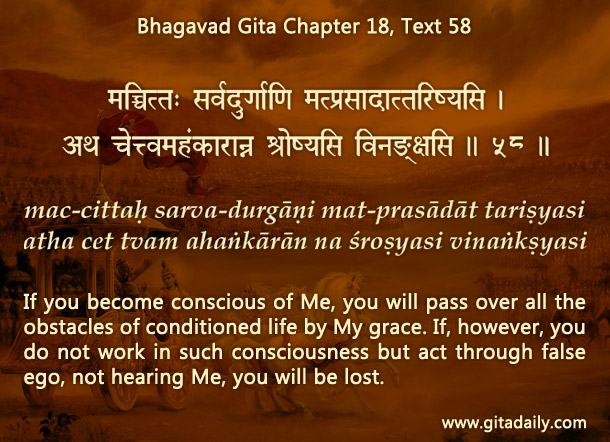Suppose a thief robs someone – that’s a wrongdoing. Additionally, if a cop were nearby but didn’t stop the thief – that’s also a wrongdoing. The cop may argue that they didn’t do anything wrong, but they didn’t do the right they are expected, obliged and paid to do.
In the Mahabharata, the elders on the Kaurava side were guilty of such a wrongdoing. They had remained silent when many atrocities were performed against the Pandavas, especially when their chaste wife, Draupadi, was publicly dishonored in the royal court.
By hearing the Bhagavad-gita, Arjuna understood that those elders were guilty of dereliction of duty. And by refusing to fight, he would become similarly guilty. As a martial guardian of society, he was dutybound to fight against aggressors who disrupted dharma, the moral and spiritual order that sustained society.
Moreover, spiritually, he was an indestructible soul, a part of the supreme soul, Krishna. He was meant to harmonize with Krishna through loving service. By failing to do Krishna’s will, which in his case was to fight against the disruptors of dharma, he would be guilty of wrongdoing in the inclusive sense of not doing the right he was meant to do.
Universalizing this spiritual import, the Gita (18.58) asserts that we will be lost if we act forgetful of Krishna and will be delivered if we act conscious of him.
People say, “See good, hear good, speak good.” Yes, that’s good, but not good enough. Why not good enough? Because we still stay spiritually lost – if we aren’t lost in impiety, we will stay lost in piety. We still stay deluded by our mind’s misconceptions about our identity and purpose.
Thus, the Gita’s essential message centers not on piety, but on spirituality – on a life devoted to Krishna.
Think it over:
- Explain the two senses of wrongdoing with examples.
- How were the Kaurava elders guilty of wrongdoing?
- Why is “see good, hear good, speak good” not good enough?
To know more about this verse, please click on the image
Explanation of article:
Podcast:


Leave A Comment